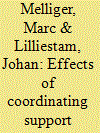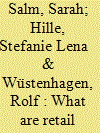|
|
|
Sort Order |
|
|
|
Items / Page
|
|
|
|
|
|
|
| Srl | Item |
| 1 |
ID:
127911


|
|
|
|
|
| Publication |
2014.
|
| Summary/Abstract |
Wind energy has been negotiated in Brazil's regulated market through auctions organized by the government. Bilateral negotiations in the free market have been scarce. In 2011 wind farms were allowed to bid in 'A minus 5 (A?5)' auctions, for energy with first delivery date 5 years ahead. This new design was expected to stimulate negotiations in the free market, as the 20-year contract in the regulated market eases financing while the 5-year grace period grants wind farms the option to sell whatever energy is generated beforehand in the free market. We modeled bidders' price decision in A?5 auctions as Real Options and concluded that given the low prices averaging USD 50/MW h, winners are tempted to defer investment, expecting more favorable equipment and energy prices, or a better knowledge of the wind site. Construction is likely to begin in 2-3 years, with little time left for the free market. Bidders that consider the option of eventually abandoning the project are more price competitive, increasing chances that some wind farms will never materialize. Therefore, this attempt to foster the free market may not pay-off and, moreover, it may have the unfavorable effect of turning Brazil's energy expansion planning a more difficult task.
|
|
|
|
|
|
|
|
|
|
|
|
|
|
|
|
| 2 |
ID:
176124


|
|
|
|
|
| Summary/Abstract |
The economic context for renewable power in Europe is shifting: feed-in tariffs are replaced by auctioned premiums as the main support schemes. As renewables approach competitiveness, political pressure mounts to phase out support, whereas some other actors perceive a need for continued fixed-price support. We investigate how the phase-out of support or the reintroduction of feed-in tariffs would affect investors’ choices for renewables through a conjoint analysis. In particular, we analyse the impact of coordination – the simultaneousness – of policy changes across countries and technologies. We find that investment choices are not strongly affected if policy changes are coordinated and returns unaffected. However, if policy changes are uncoordinated, investments shift to still supported – less mature and costlier – technologies or countries where support remains or is reintroduced. This shift is particularly strong for large investors and could potentially skew the European power mix towards an over-reliance on a single, less mature technology or specific generation region, resulting in a more expensive power system. If European countries want to change their renewable power support policies, and especially if they phase out support and expose renewables to market competition, it is important that they coordinate their actions.
|
|
|
|
|
|
|
|
|
|
|
|
|
|
|
|
| 3 |
ID:
150062


|
|
|
|
|
| Summary/Abstract |
Local government in Australia has a strong collective capacity to reduce GHG emissions through policies, funding allocation to renewable energy projects and the delivery of programs and services. This study examines the institutional capacity of councils in Sydney and how this impacts on decisions to invest in alternative energy projects. We find greenhouse gas emission targets of councils are strongly aligned to national targets but do not reflect the local council's institutional capacity, political leadership or strategic priorities. Energy reduction projects are often identified and undertaken by environmental staff without support from financial staff or financial-evaluation tools. An absence of national guidelines to provide consistency in tracking and reporting limits cross-sector benchmarking. Street lighting contributes to a significant proportion of council's total electricity expenditure and GHG emission profile. Being highly regulated, existing contracts and the current practice of street lighting services limits the councils’ ability to reduce emissions. Based on our analysis we recommend a number of measures to overcome these constraints including the use of financial evaluation tools for small-scale renewable energy projects, a standardised national tracking and reporting platform to facilitate progress-reporting and meaningful comparative analysis between councils and policy reform to the regulation of street lighting.
|
|
|
|
|
|
|
|
|
|
|
|
|
|
|
|
| 4 |
ID:
150061


|
|
|
|
|
| Summary/Abstract |
Citizens own nearly half the renewable energy generation capacity in Germany and have been important drivers of the country's energy transition. In contrast to citizens' important role in financing renewable energies, the energy policy and economics literature has traditionally focused on other investors, such as incumbent energy firms. To close this gap, this paper reports on a large-scale survey of 1,990 German retail investors. Conducting a choice experiment with the subset of 1,041 respondents who expressed an interest in investing in community renewable energy projects, we present a unique dataset allowing for new insights in risk-return expectations of retail investors. We find that apart from return on investment, respondents are particularly sensitive to the minimum holding period and the issuer of community renewable energy investment offerings. A minimum holding period of 10 years implies a risk premium of 2.76% points. A subsequent segmentation analysis shows that two groups of potential community renewable energy investors with different risk-return expectations can be identified: “local patriots” and “yield investors”. In contrast to professional investors, a majority of retail investors use simple decision rules such as calculating payback time or relying on their gut feeling when making investments.
|
|
|
|
|
|
|
|
|
|
|
|
|
|
|
|
|
|
|
|
|